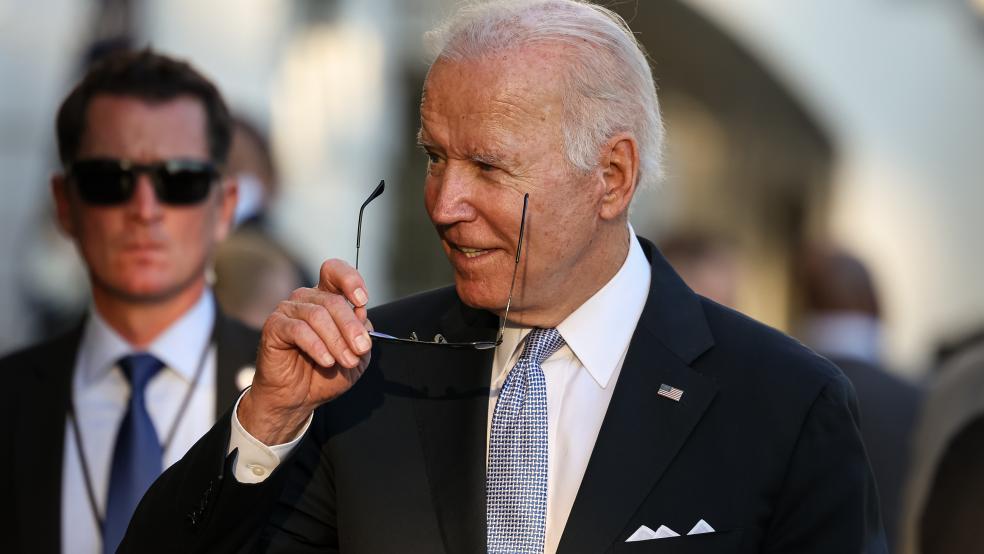For President Joe Biden and congressional Democrats, it’s one down and one to go.
After a day full of drama, the House late Friday passed the $1.2 trillion bipartisan infrastructure framework, sending the bill to the president’s desk and providing Biden with a much-needed political win after months of intraparty quarrels and sagging approval ratings.
The passage came after clashing moderate and progressive Democrats agreed to a compromise that had five centrists commit in writing to vote next week for the Build Back Better bill, the other major plank of the party’s economic agenda, if a Congressional Budget Office analysis of the package comes back in line with White House estimates. The centrists also pledged to work toward passage of the bill if the CBO numbers differ from what’s expected. Two other holdout centrists did not sign on to the statement.
Even with that agreement to address long-running factional fights — and despite both public and private pleas from Biden for lawmakers to approve the infrastructure bill and pass a rule for debating the social spending package — the package would not have passed without the support of 13 Republicans, including six from New York and New Jersey. Six Democrats — members of the progressive “Squad” — bucked their party to vote against the plan. The final vote was 228 to 206.
What’s in the infrastructure bill: As a reminder, the bill set for Biden’s signature provides for $550 billion in new spending over five years, including $110 billion for roads a bridges, $73 billion to upgrade the electric grid, $66 billion for passenger and freight rail, $65 billion for broadband internet, $55 billion for water projects, $50 billion for climate change resiliency, $42 billion for airports and ports and $39 billion for public transit. The package also re-authorizes some $650 billion in surface transportation funding, including a boost to highway spending. The Congressional Budget Office said in August that the legislation would add $256 billion to deficits through 2031.
What’s next: The focus now will shift to the Build Back Better bill, but not before Biden and Democrats take an extended victory lap, touting a historic, bipartisan achievement — and it is undoubtedly historic, the largest single infrastructure investment in more than a decade. “Well, finally: Infrastructure Week. I’m so happy to say that: Infrastructure Week,” Biden said in Saturday morning. “I don’t think it’s an exaggeration to suggest that we took a monumental step forward as a nation.”
Congress is out this week, so the White House is expected to hold a public signing ceremony next week, when lawmakers are back. But the public messaging blitz has already begun, and officials reportedly plan to fan across the country to explain what the bill means for Americans in different regions. Biden is scheduled to kick off that push by visiting Baltimore Wednesday to talk about how the legislation will upgrade that nation’s ports and help address supply chain disruptions. He told reporters on Saturday that Americans will probably start to see the effects of the bill “within the next two to three months.”
The administration will likely continue touting the details of the infrastructure plan over that period, or longer. “White House officials know the traditional knock on Democrats is they can’t ever seem to take credit for their achievements, failing to win over voters even with policies that are broadly popular,” The Washington Post’s Olivier Knox notes. “Democrats also know they can’t let that happen this time.”
The path ahead for BBB: Democrats’ celebratory public messaging could still be undermined by continued uncertainty and intraparty fights over the social spending and climate legislation.
The Congressional Budget Office score could present some fresh challenges. First, it’s not clear yet when it will arrive, and it might not come until the days before Thanksgiving, potentially upending Democrats’ preferred timeline. Second, the score could also differ in some important ways from White House estimates, including revenue projections from beefing up IRS enforcement efforts to close the tax gap, which the administration says could generate about $400 billion.
Even if the CBO doesn’t add significant hurdles to the Build Back Better bill’s path in the House, the legislation faces an uncertain fate in the Senate, where Sen. Joe Manchin (D-WV) remains opposed to the paid family and medical leave provisions House Democrats reinserted into the package, among other elements. And any changes could lead to renewed intraparty battles that delay or derail the bill., “My fear is not that it won't pass but that it will go back to the Build Back Better Manchin framework,” one unnamed lawmaker told the Post.
At the very least, the path ahead likely involves long negotiations, after which any bill passed by the Senate would have to again clear the House.
The bottom line: “I am confident that during the week of Nov. 15, the House will pass the Build Back Better Act,” Biden said in a statement Friday night. But it will likely be at least several more weeks before Biden can start thinking about hosting another signing ceremony. Oh, and lawmakers will also have to deal with funding the government early next month to avoid a shutdown — and there’s likely a repeat looming of the fight over raising the debt ceiling. Those battles may well complicate the timing of the Build Back Better bill.





